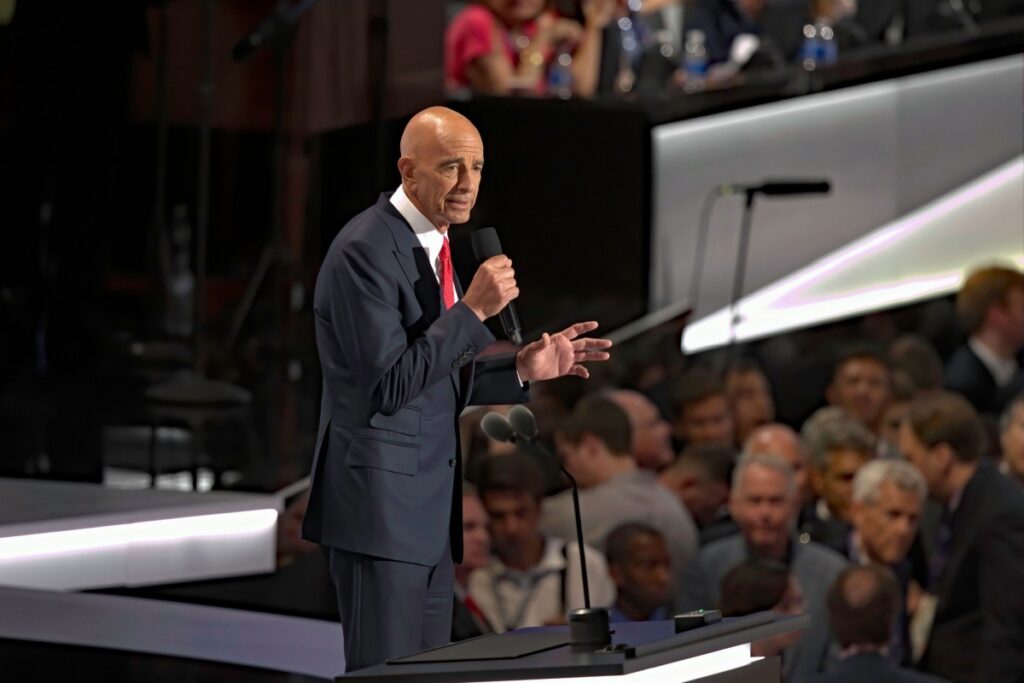Press Conference Remarks Spark Outcry
During a press conference in Beirut this week, Tom Barrack, serving as the U.S. Ambassador to Turkey and Special Envoy to Syria, drew sharp criticism after remarks directed at members of the Lebanese press. When journalists asked him to approach the podium to speak more clearly, Barrack declined and told them they should “act civilized, act kind, act tolerant,” adding that if the situation became “chaotic, like animalistic,” his delegation would leave the room.
The phrase struck a nerve in Lebanon, where reporters have long been at the forefront of political and social debates and where media freedoms are considered both fragile and vital. Barrack’s choice of wording was immediately perceived as disparaging toward the press corps, many of whom were covering his trip under tense security conditions. His comments quickly spread across social media platforms, prompting strong reactions from professional associations and government offices.
Backlash and Official Responses
The Lebanese Press Syndicate, the country’s leading body representing journalists, issued a statement condemning Barrack’s language as inappropriate and disrespectful. The syndicate warned that unless an official apology was forthcoming, it would consider measures including boycotting his future appearances in Lebanon.
The Presidential Palace also weighed in, expressing regret over the incident. In its statement, the presidency described Barrack as “a guest of Lebanon” but emphasized that the Lebanese press had acted with full professionalism. Officials underscored the importance of respecting journalists’ role in a democratic society, especially in times of political and security uncertainty.
Reaction was not limited to journalists and government officials. Political commentators across Lebanese television channels and newspapers highlighted the remarks as reflective of a broader tension between foreign envoys and local institutions. For many, the incident underscored how sensitive language can become in a country still recovering from years of political turmoil, economic collapse, and periodic armed conflict.
Diplomat Issues Apology
Facing mounting criticism, Barrack sought to clarify his intent. In a later interview with broadcaster Mario Nawfal on the X platform, he stated that he had not meant to demean the press. “Animalistic was a word that I didn’t use in a derogatory manner,” he explained. “But it was inappropriate to do when the media was just doing their job.” He went on to acknowledge: “I should have been more generous with my time and more tolerant myself.”
By admitting that his remarks were poorly chosen, Barrack attempted to ease tensions and reaffirm his respect for Lebanon’s journalists. His apology, however, came as part of a broader effort to keep attention focused on the delicate diplomatic mission he was undertaking rather than on controversy surrounding his words.
Observers noted that Barrack’s swift apology contrasted with other cases where foreign officials have stood by controversial remarks. The decision to retract and clarify was seen by analysts as a sign of the importance Washington places on maintaining credibility in Beirut at a time of heightened regional volatility.
Context of Barrack’s Visit
Barrack’s trip to Lebanon occurred against the backdrop of sensitive negotiations on the disarmament of Hezbollah and the fragile ceasefire that followed a major flare-up between Israel and Hezbollah in November. The United States has been pressing for a framework that would reduce Hezbollah’s military presence near the Israeli border, with the aim of preventing further escalation.
Israeli Prime Minister Benjamin Netanyahu recently suggested that Israel might consider a phased withdrawal from southern Lebanon if credible disarmament steps were implemented. Yet critical questions remain unresolved, including the timetable for any withdrawal, the verification of disarmament, and the role of international mediators in monitoring compliance.
Despite the diplomatic dialogue, the Israeli army has continued to carry out airstrikes in southern Lebanon, targeting what it describes as “terrorist infrastructure and rocket platforms” associated with Hezbollah. These operations highlight the fragility of the current truce and the potential for renewed conflict if political negotiations falter.
Barrack’s role as envoy places him at the intersection of U.S. regional policy and Lebanon’s internal challenges. Washington has long supported Lebanese sovereignty while simultaneously designating Hezbollah as a terrorist organization. Balancing these positions requires careful diplomacy, and the controversy over his language added an unexpected complication to an already difficult mission.
US-Lebanon Relations and Broader Implications
The United States has historically played a significant role in supporting Lebanon, providing humanitarian and military aid while encouraging political reforms. In recent years, Lebanon’s financial collapse, compounded by the 2020 Beirut port explosion and ongoing regional instability, has made international assistance even more critical.
Barrack’s visit was intended to reassure Lebanese authorities of U.S. support while also pressing for progress on security issues that directly affect Israel and the wider Middle East. The backlash over his remarks illustrates how quickly diplomatic efforts can be overshadowed by cultural sensitivities and the weight of public perception.
While the envoy has now issued an apology, the incident may linger in the collective memory of Lebanese journalists as an example of the need for mutual respect in international diplomacy. It also serves as a reminder that language—especially when used in politically charged contexts—can carry consequences well beyond its original intent.


